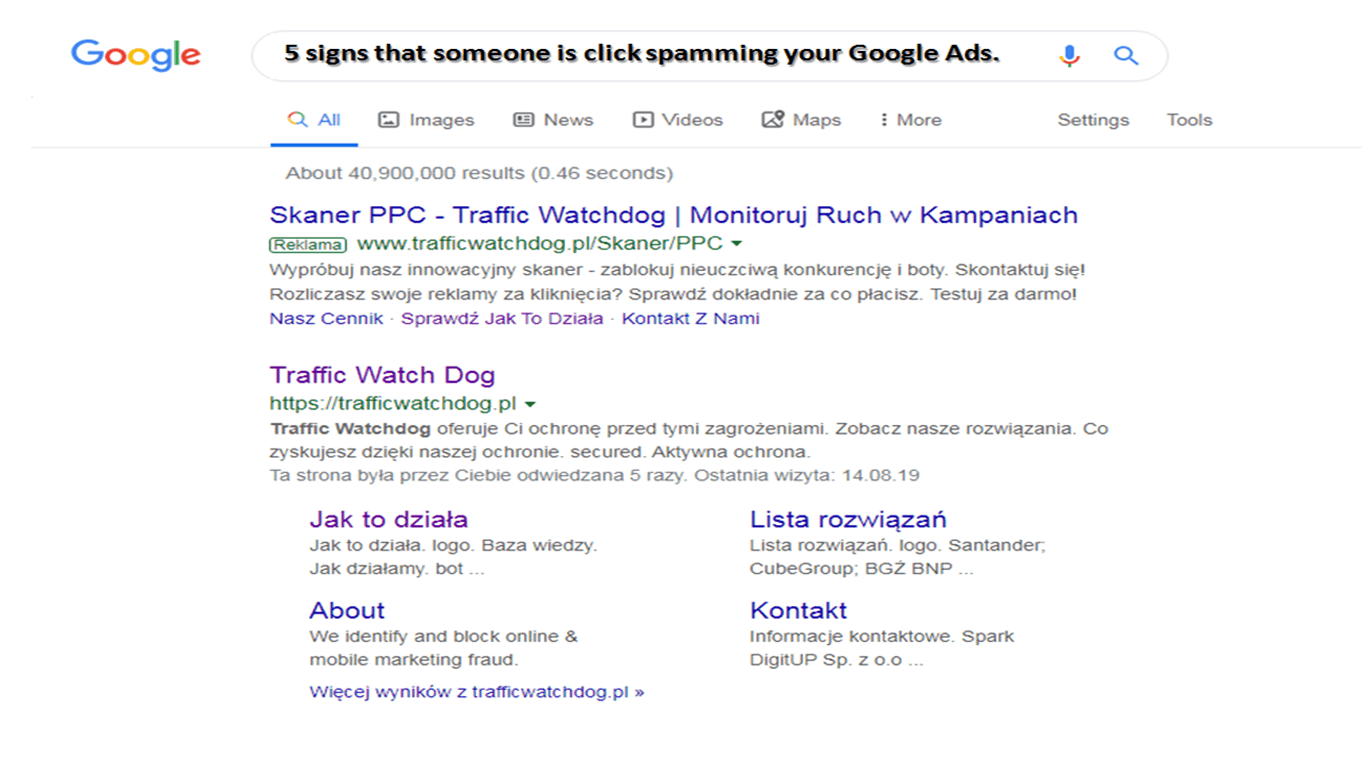5 signs that someone is click spamming your Google Ads.

source: own elaboration
Many companies that offer their services online use Google Ads. However, only some of them are aware that the keywords they pay for may be clicked by dishonest competitors or malicious Internet users. How to check if this also applies to your campaigns? Here are five factors that may indicate that someone is click spamming your ads.
-
A significant difference in the number of clicks.
The first sign that someone is click spamming your ads will certainly be an increased number of clicks. Companies that pay for many keywords should check the number of clicks for each of them. If any of them noticed a particularly large increase in the number of clicks in a short time, this may be the first signal that someone is click spamming their ads. Of course, the difference in the number of clicks is not enough - you should also look for other signs of Google Ads click spamming.
-
Reduced conversion rate.
If your business has been using Google Ads for some time, you certainly have information on the conversion rates of individual campaigns. It is one of the best known forms of measuring effectiveness in online marketing and helps to determine how many clicks on given keywords end with a sale (or other action). The conversion rate can also be a tool to help determine, if someone is spam clicking your ads. It's best to see how big it is for individual keywords in specific campaigns over the shortest periods of time. If for some reason the conversion rate has significantly decreased its value for a certain term, it may mean that someone is click spamming your ads (especially if this is accompanied by an increase in the number of clicks in the same keywords). Of course, this symptom will only appear if someone has just started click spamming your ads - if he has been doing this for a long time, this won't be reflected in the change in the number of conversions. This measure will also not be useful if you have just started using Google Ads - because you won't have a reference point. Therefore, from the very beginning, monitor the number of conversions generated by individual campaigns and compare results for given time periods.
-
Faster running out of advertising budget.
A clear symptom that someone is click spamming your ads may also be faster exhaustion of advertising budget in Google Ads, of course, assuming that the other factors have not changed. If suddenly the same amounts are enough in a given campaign for a much shorter time, it may indicate that some part of the budget is artificially clicked. Some people click spam ads until the entire budget allocated to the campaign has been exhausted, so if an advertiser notices that the Google Account has run out too soon, they should immediately report the matter to Google support.
-
Lower sales generated from Google Ads.
More experienced scammers can click on your ads in such a way that it will not be obvious to notice a drastic change in the areas mentioned above. Then comparing sales results can be helpful. People click spamming on your ads can manipulate the number of clicks in particular periods or act carefully enough so that the conversion rate does not change too noticeably. But one thing is certain - if they want your Google Ads budget to be wasted, artificially generated clicks won't end with sales. Of course, whether the difference will be easy to detect depends on the volume of turnover generated by the company in individual periods, but if we assume that other conditions have not changed - the decrease in sales value will be one of the effects of click spamming your Google Ads.
-
Disturbing statistics on your Google Ads account.
Google strives to provide its clients with statistics on various factors. Some of them can be a clear indicator that someone is click spamming your ads. The easiest statistics to check is the change in the price of the keywords. The higher the number, the more people are interested in a given words, so more Google searches will apply to it. By click spamming ads (especially if someone does it manually), keywords will often be entered in the search engine, and the scammer may routinely use the same wording. This will certainly be reflected in the price the advertiser pays for the given keywords.
Other statistics provided by Google in the partner's account are invalid clicks and their rate, i.e. the ratio of the number of invalid clicks to all generated. Of course, they only include clicks classified by Google algorithms as inappropriate. Their values can be found by expanding the Performance field by adding the appropriate column.
It's also worth looking at the data on Geographic Performance, especially the locations from which clicks were made. If the campaign suddenly started to get large numbers of clicks from suspicious areas, this may indicate that some of them came from fraudsters.
Although all of the signs mentioned above may indicate that someone is click spamming your ads, but none of them confirm it clearly. To make sure that your Google Ads clicks come from people really interested in your offer, you can use professional companies - such as TrafficWatchdog. They create complicated algorithms that are to recognize the attempt of fraud and prevent it.

